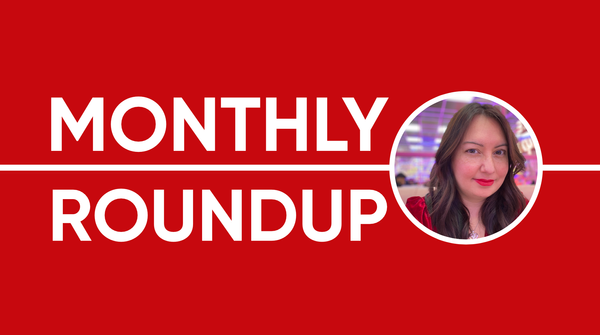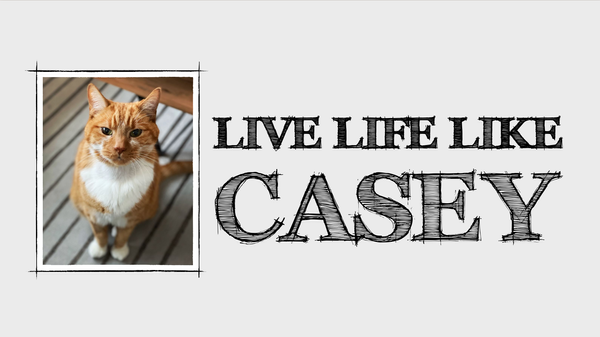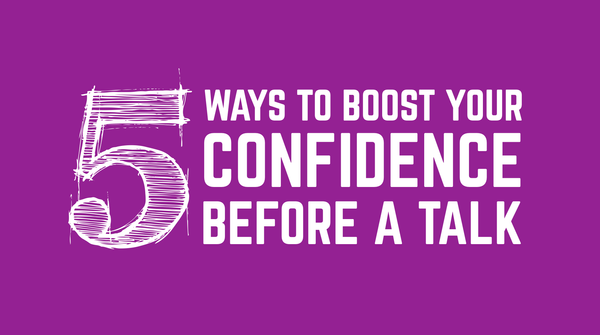Workshops to Brainstorm Life & Career Goals
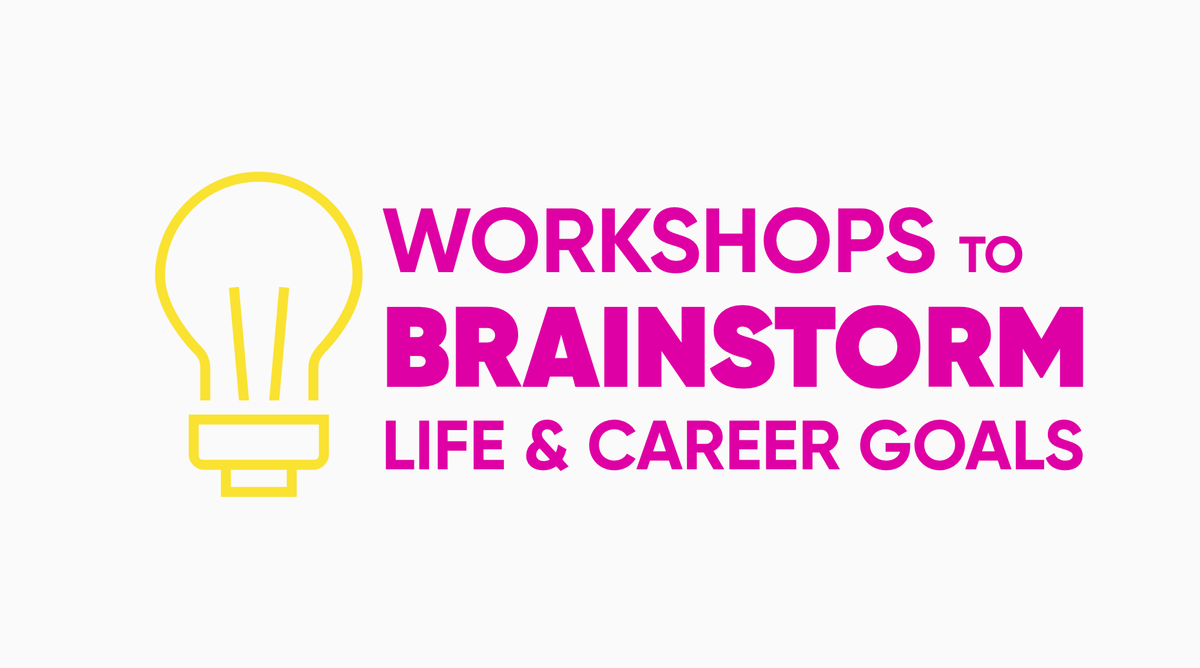
Where do you see yourself in 5 years time?
I used to dread this question. It always made me feel as if I should know the answer to this – rather than just making it up as I go along as I normally do. And I felt bad that this wasn’t something that I inherently knew.
Yet often when managers talk about setting goals, this is one of the first things they ask. There’s this expectation that someone has taken the time already to stop and think about this. That someone knows what their big goals should be.
A lot of the learning material out there about goals tend to be more about what comes after someone has come up with a goal. Things like SMART or GROW, it’s all about helping people reach their goals, but it all assumes that people already know what they want to do.
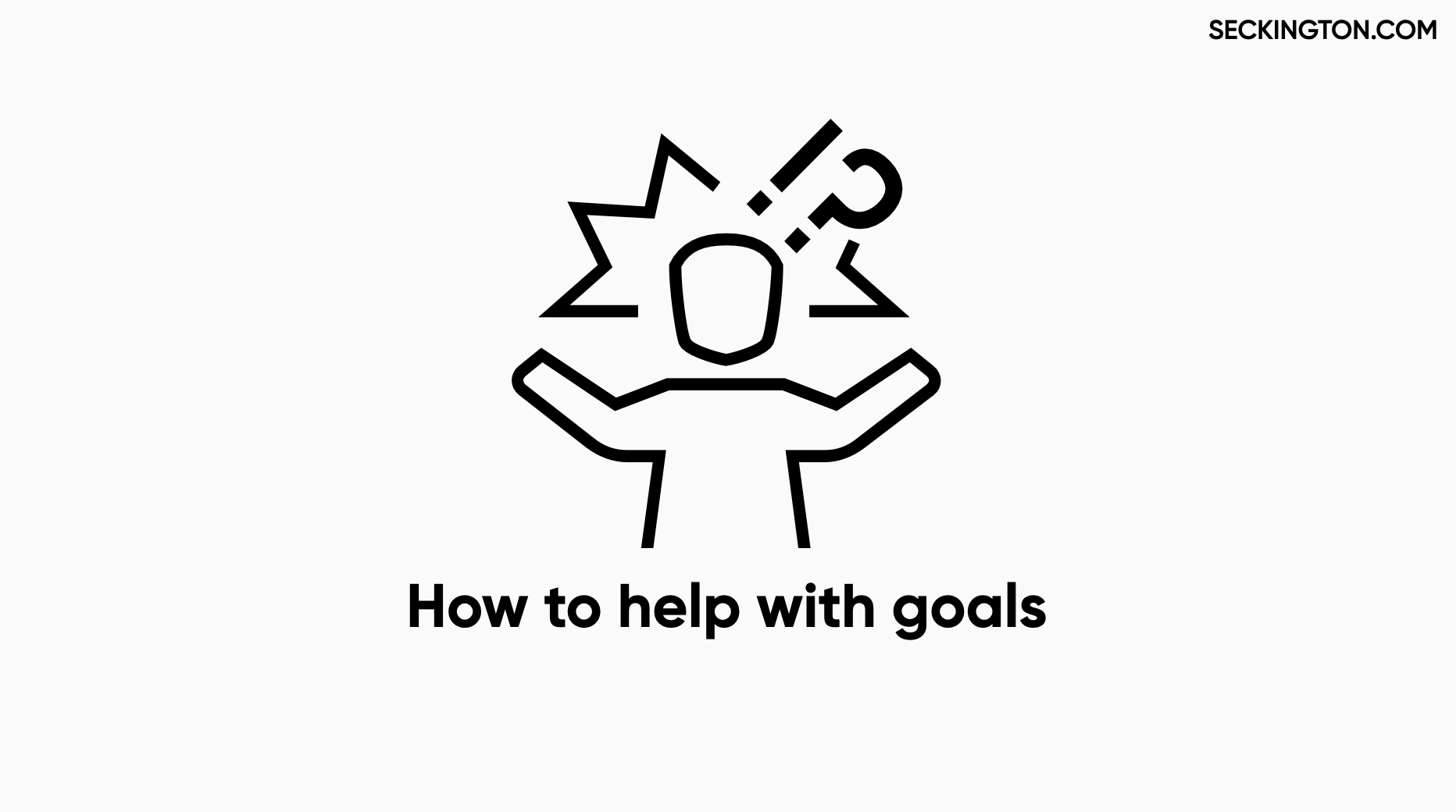
But what if you don’t know what your goals should be, how do figure that out?
A couple of years ago I started doing workshops with my reports about their life and career goals – to get people to take the time to think big and get them to reflect on all of this. Before going into the nitty gritty details of coming up with more granular achievable goals, I wanted them to brainstorm all the different things they could do.
This post is about how to do that type of workshop. It's mainly intended for managers to use with their people in 1:1s, but you can use it on your own for you to figure out what you want to focus on, or you can bring it to your manager and ask them to do the workshop with you.
Want to use this workshop with the people you manage? I've turned the questions into an easy-to-use worksheet - if you're a subscriber to my newsletter, you can download and use it with your reports:
This workshop is about generating as many ideas as possible. Usually you might already have a sense of which things are important to someone, but the focus is on going wide rather than deep. Later on you can help with choosing and fine-tuning the actual goals.
The format of these workshops is very dependent on the person. This can be either done as a one off thing: some people might go super quickly through all the questions or they may gravitate to only a specific section. Others might take their time and want to go think deeply about every question. If there’s a lot to go through, we’ll split the workshop out over several catchups.
I normally leave it up to each person how much prep time they want: some are happy to just get the questions thrown at them in the workshop, others prefer getting them beforehand and having more time and space to reflect and think on their own. It’s easier to give at least some questions or ideas beforehand, so people can get in the right mindset for this.
Whichever approach you go for it's key to provide the appropriate amount of time and space for that person to reflect.
There are typically 4 different areas of types of questions I ask during a brainstorming goals workshop: Values, Future, Current skills and Current role:
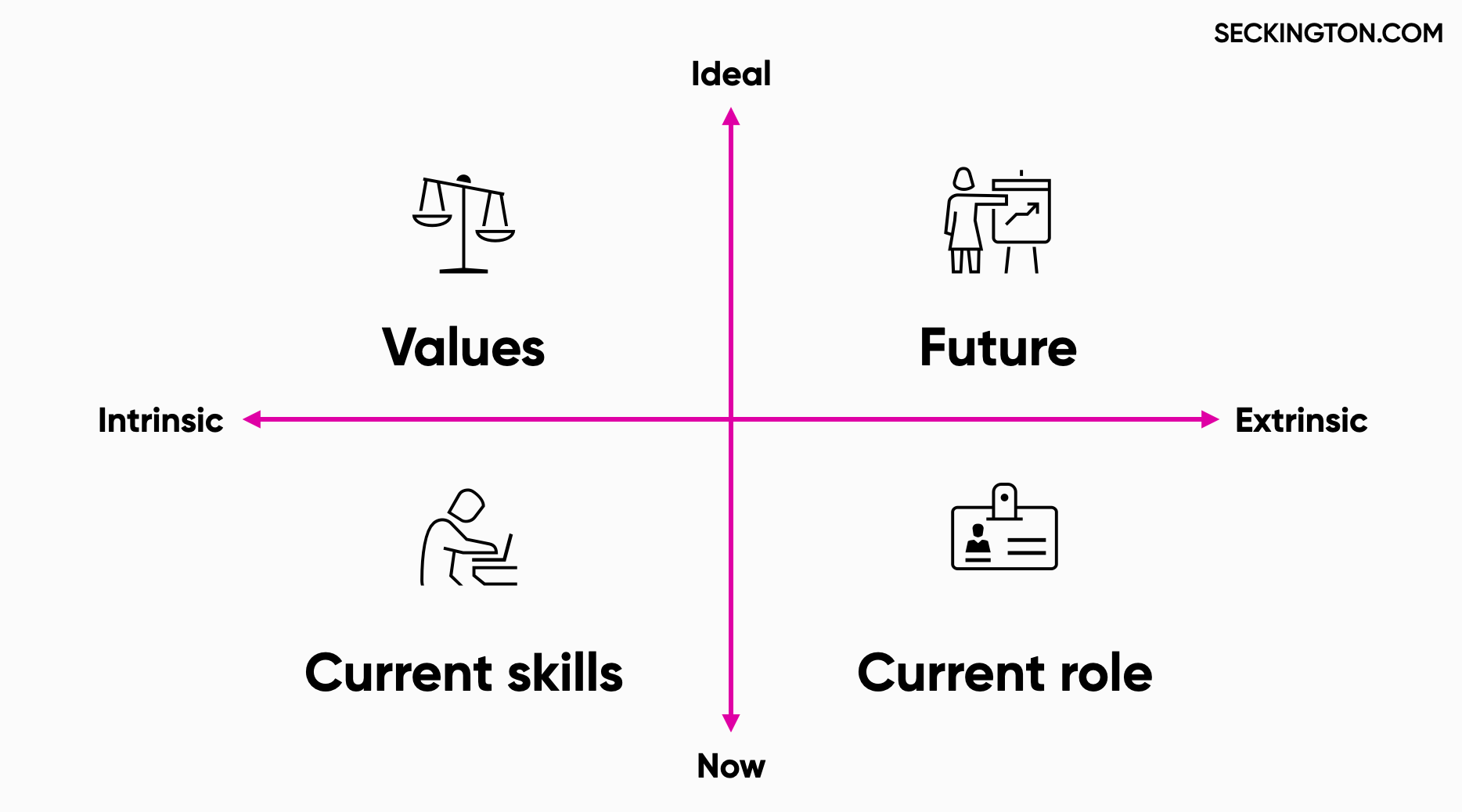
On the left we have the questions that are more inward facing – looking at the intrinsic, and on the right we have the more external factors, like environment, other people, the wider world. Then at the top we have the ideal world that we’d like to have and at the bottom we have our current state.
Different people will need different prompts to get them thinking, and I’ve found splitting it out like this makes it easier to see which things people are more drawn to and what they are more motivated by.
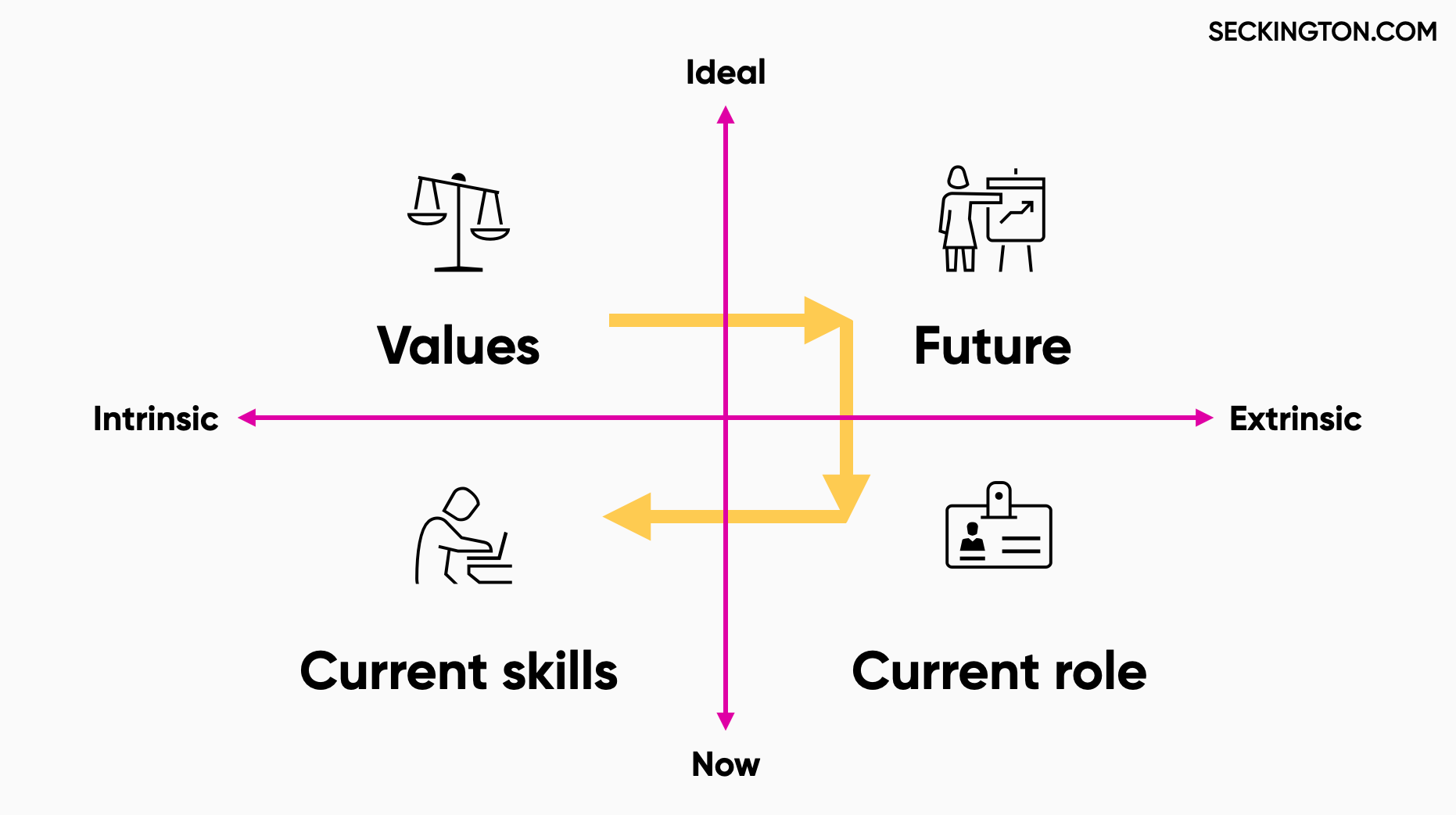
I’ll go through the 4 areas in this order, cause if you’re doing it as workshop, it makes the most sense following this pattern – starting with the internal ideal, then going big picture and then ending on the current role and current skills. Especially cause the answers to things early on, could influence questions in the later phases.
For instance, if someone says “I really value doing things efficiently” during the values phase, it’s worth asking later whether they think they get to do things efficiently in their current role. So a lot of this is fluid and will influence each other.
However, if the person you're doing this with is drawn to a specific area and already has answers to specific questions, start there!
Values
The first section is about values – this is about getting people to look inwards. To get them to stop and think about what their ideal self is and what they believe about themselves:
Reflect on who you are. What is your ideal self? What do you believe about yourself?
Ask them questions to get them to reflect and think about who they are and how they do things:
- What are the building blocks that make up you?
- How would you describe yourself in 5 words?
- What is your purpose?
- What is your passion?
- What motivates you?
- Where do you get your energy from?
These are the questions I normally use – this is no means an exhaustive list, but I wanted to highlight the types of questions you should be thinking of.
An extra thing you can do here is to use personality tests or quizzes, since they're good ways to help people reflect. These tests can be quite binary (you’re either X or Y), but the interesting thing to me is getting people thinking about “well, actually, in these situations I might be doing more of X, while in these specific situations I might be doing Y”. Even if the person doesn’t agree with the results, it's a useful insight to have and it's a nice starting point for conversations.
Future
The second area is about the future – so here you want to look at the larger world and the person’s ideal place in it.
Think about long term goals. What impact do you want on the world? What are your life goals?
Ask questions to get people thinking what their ideal life and career would be:
- Imagine you’re retiring and looking back at your life: what do you want to have achieved?
- Where do you want to be in 5 years time? 10 years?
- What does work-life balance look like for you?
- What does your ideal day look like?
This is often one of the hardest areas for people to reflect on, but given enough time and space to think, most people will be able to come up with stuff here. I’ve noticed the first question of “Imagine you’re retiring and looking back at your life” generally is easier for some people to answer, then where do you want to be in 5 years. Mainly cause you’re not asking for concreteness yet – people don’t have to have a plan yet on how to reach it.
The other stuff to ask is more about the day to day. What does work-life balance look like? What does your ideal day look like?
While we are talking about this in a work context, don’t limit people to think only about work stuff – things like exercise and meditation can help people a lot. If that’s something your people want to work on and make time for, let them bring it up in this workshop. Once you start looking at the more tangible goals, you can help them figure out how to relate those type of aims to their day to day.
Finally, for some people you might need to frame these as anti-goals – so what are the things they don’t want to happen. Like “I never want to be bored” or “I never want to work overtime”. Flipping it to this perspective can help certain people come up with goals they might not necessarily have thought of initially.
Current role
The third area is looking at their current role. This brings it back to the day to day and is a good time to reflect on the short term. How have their past few weeks or months been?
What do you like about your current role? What do you dislike?
Ask questions to get someone to reflect on their current role and company:
- What are the challenges of your role?
- Which of your abilities, interests and/or values are you able to do in your role? Which would you like to do more of?
- What would you miss if you left your role? Why?
- What kinds of people do you most enjoy working with? What work environments do you enjoy the most?
So get people to reflect on what they currently do and how they fit in to the company. If you're doing this workshop following a performance review or 360 review cycle, you can also ask questions about that feedback here. It’s all about getting an understanding of what they think are areas of things they could work on, improve in or do more of.
An extra thing here is to use a job description or career development framework to help with this. If your company doesn’t have these, it doesn’t have to be from your current role or company! It also doesn't have to be their current job description - if they have an idea of a role that they want to be doing, use that as inspiration. If it works as a prompt for them, use it!
Current skills
The final area to look at are the current skills. This is helping people to reflect inwards again and get them thinking about what their strengths and weaknesses are.
What are your strengths? What are your weaknesses?
Ask questions to get them to think about their current skills and what they want/should get better at:
- What do you do better than others? What do others see as your strengths?
- Are there any gaps in your knowledge or experiences?
- What technical skills can you develop? What communication skills can you develop? What leadership skills can you develop?
Now at this point, you’ll have answers from other areas as well – and it’s a good time to use them to ask more specific questions. Ask them followup questions based on previous answers: for instance, if the previously said they that they see their purpose as helping other, ask them if they're able to do that regularly.
Also, if they have a specific role in mind that they want to end up, it’s worth using that to compare to and do a skills gap analysis.
Recap
So those are 4 areas of questions to ask: Values, Future, Current role and Current skills.
It can easily be that one person is drawn to only 1 area, or only to very specific questions in an area, while someone else is drawn to 2 different areas. The point of these questions is not to have answers in every single section, but rather to have them as prompts, as conversation starters. And once you have the answers to these, it should be easier to make the jump from these to actual goals.
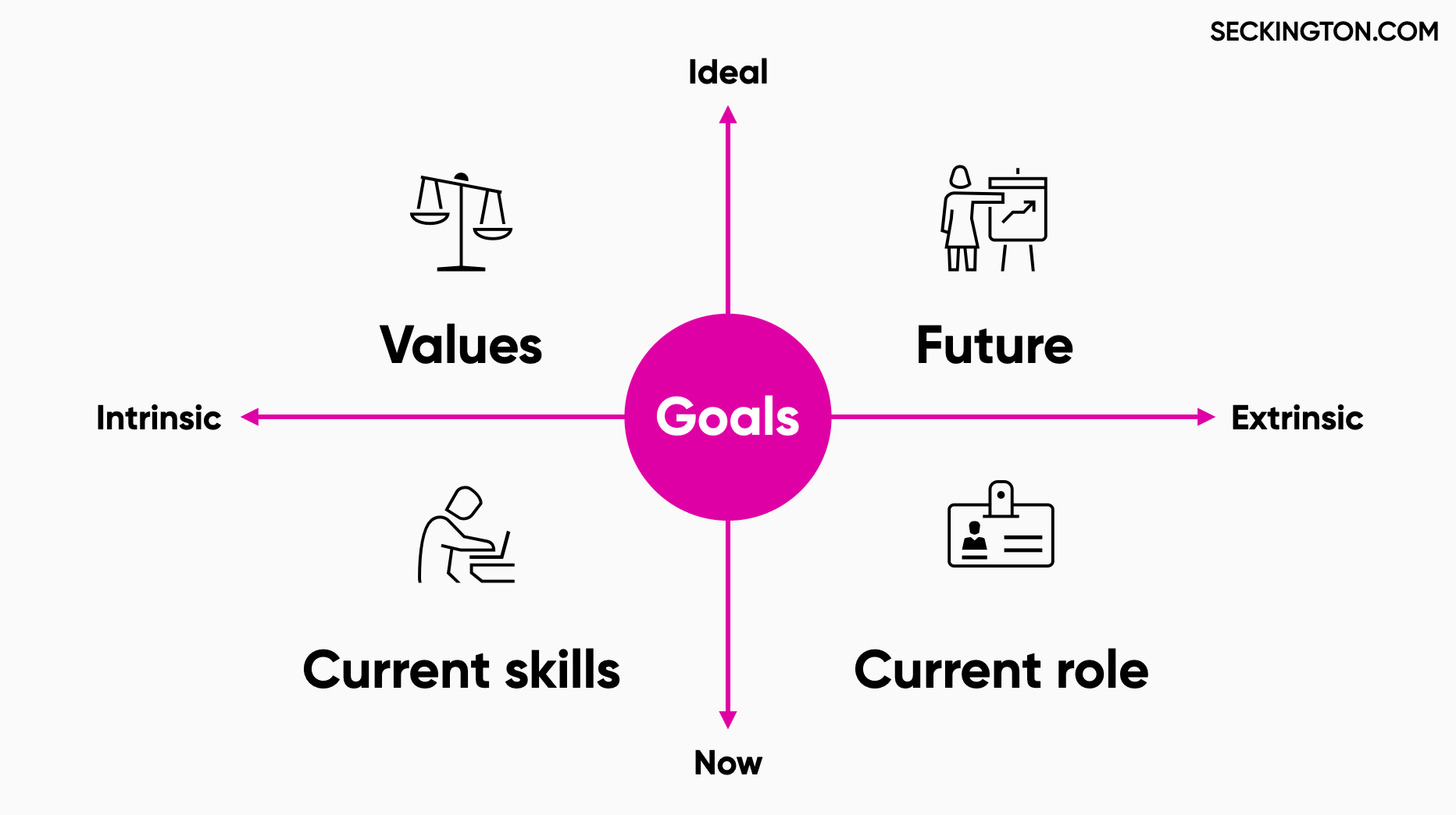
In the end all of this is mainly to get people to really reflect and think about what they want to do. To lead them down that rabbit hole and get them thinking about all of the dreams and ideas they could be working towards. I think goals are some of the most important things that managers should be helping with.
Cause if they don’t, we risk creating the human equivalent to technical debt. Waking up one day and realising that you don’t like the person you’ve become or wishing you had focused on different skills, different passions, different goals.
Where do you see yourself in 5 years time?
I don’t think you really ever need to know the answer to that question. But whatever you do you should always be thinking about what’s next for you?
“Which way you want to go depends on where you want to get to…”
~ Alice in Wonderland
You need to understand who you are as a person and what you want from life. And as leaders, you should be helping your team to figure this out.
Make some time to stop and think about what’s next for you, what's next for your team and how to get there.
Want to do this workshop with the people you manage? I've turned the questions into an easy-to-use worksheet - subscribers to my newsletter can download and use it with your reports:
Interested in engineering management training? Get in touch with me to discuss what you’re looking for.
